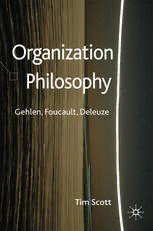
Organization Philosophy: Gehlen, Foucault, Deleuze PDF
Preview Organization Philosophy: Gehlen, Foucault, Deleuze
Organization Philosophy This page intentionally left blank Organization Philosophy Gehlen, Foucault, Deleuze Tim Scott Senior Lecturer in Organization, University of St Andrews © Tim Scott 2010 Softcover reprint of the hardcover 1st edition 2010 978-0-230-24722-2 All rights reserved. No reproduction, copy or transmission of this publication may be made without written permission. No portion of this publication may be reproduced, copied or transmitted save with written permission or in accordance with the provisions of the Copyright, Designs and Patents Act 1988, or under the terms of any licence permitting limited copying issued by the Copyright Licensing Agency, Saffron House, 6–10 Kirby Street, London EC1N 8TS. Any person who does any unauthorized act in relation to this publication may be liable to criminal prosecution and civil claims for damages. The author has asserted his right to be identified as the author of this work in accordance with the Copyright, Designs and Patents Act 1988. First published 2010 by PALGRAVE MACMILLAN Palgrave Macmillan in the UK is an imprint of Macmillan Publishers Limited, registered in England, company number 785998, of Houndmills, Basingstoke, Hampshire RG21 6XS. Palgrave Macmillan in the US is a division of St Martin’s Press LLC, 175 Fifth Avenue, New York, NY 10010. Palgrave Macmillan is the global academic imprint of the above companies and has companies and representatives throughout the world. Palgrave® and Macmillan® are registered trademarks in the United States, the United Kingdom, Europe and other countries ISBN 978-1-349-31977-0 ISBN 978-0-230-27755-7 (eBook) DOI 10.1057/9780230277557 This book is printed on paper suitable for recycling and made from fully managed and sustained forest sources. Logging, pulping and manufacturing processes are expected to conform to the environmental regulations of the country of origin. A catalogue record for this book is available from the British Library. A catalog record for this book is available from the Library of Congress. 10 9 8 7 6 5 4 3 2 1 19 18 17 16 15 14 13 12 11 10 To Laurie and Molly This page intentionally left blank Contents List of Figures xi Preface xii Foreword xiii Acknowledgements xv Introduction 1 Guide to the text 3 1 The Organized Body 9 1.1 The organic sense of organization 10 1.2 Organ-Machines 13 1.3 Anthropology and organization: Gehlen’s Man 15 1.4 Man’s burden and relief 16 1.5 Burden and relief in the organization of mind 18 1.6 Man’s affective response to world-openness: Motivation, work and organization 19 1.7 Embodiment and organization in sociology 23 1.8 Internal and external disciplines of embodiment 25 1.9 Examples of embodiment: (I) Sitting and walking 27 1.10 Examples of embodiment: (II) The hand 29 1.11 The mutual organization of hand and mind 32 2 Technologies of Embodiment 34 2.1 A medicine of species 35 2.2 The primary spatialization of pathology 36 2.3 The secondary spatialization of pathology 39 2.4 The tertiary spatialization of pathology 42 2.5 The common syntax of illness and speech 44 2.6 The glance and the knife: Dissection and organization 46 2.7 Clinical organization: The role of medical technology 48 vii viii Contents 2.8 The stethoscope 49 2.9 The spatialization of medical technology 50 2.10 The ophthalmoscope and ophthalmometer 53 2.11 The laryngoscope 56 2.12 The X-ray 57 3 Subjective Empiricism and Organization 59 3.1 How mind is organized into a subject by the natural principles of association 62 3.2 Sensation and organization 66 3.3 The general rules: Artifice and organization 68 3.4 Hume’s critique of egoism: Partial sympathy, the natural unit of society 71 3.5 The rule of property 73 3.6 The institution as the social embodiment of practical reason 75 3.7 Hume’s theory of power and organizational implications 76 3.8 Some further implications of Hume’s empiricism: Relations and difference as the bases of organization 79 3.9 Conclusions: Hume and organization 81 4 Organization and Becoming 83 4.1 Hegel’s logic of determination 83 4.2 Bergson’s critique of the dialectic: Contingency and abstraction 86 4.3 Difference as the internal movement of being: Causa Sui 89 4.4 Organization is unforeseeable 91 4.5 Bergson’s critique of the One and the Multiple 95 4.6 Against state philosophy: Order v. organization 97 4.7 Organization as the actualization of the virtual 98 4.8 Bergson’s critique of possibility and realization as the locus of order: Virtuality and actualization as the locus of organization 100 4.9 The limits of Bergsonism: Differentiation is only the first part of organization 101 Contents ix 4.10 Difference and univocity: Towards an organizational logic 103 5 Organization and Affirmation 107 5.1 Nietzsche and critique 107 5.2 Total critique as re-evaluation: Pars Destruens, Pars Construens 108 5.3 Nietzsche’s perspectivism 110 5.4 The form of the question in Nietzsche 113 5.5 Nietzsche’s slave logic and master logic: Who wills organization? 115 5.6 Nietzsche’s critique of humanism 121 5.7 Organization: Consciousness and the body 123 5.8 The path to self-consciousness in Hegel: Labour, desire and consumption 125 5.9 Nietzsche on labour, desire and consumption 127 5.10 Labour as human essence 128 5.11 Nietzsche’s dicethrow: Will to power and eternal return 130 5.12 Organization: Will to power and eternal return 132 5.13 Organization: Burden or relief? 134 5.14 Nietzsche and organization: Affirmation of affirmation 135 6 Organization as Joyful Practice 138 6.1 Spinoza’s materialism: Substance, attributes and modes 138 6.2 Spinoza’s expressivism and organization 141 6.3 Spinoza’s analysis of power: Organization, a power to affect and to be affected 143 6.4 Spinoza’s corporeal philosophy 147 6.5 Implications of Spinoza’s corporeal philosophy for organization theory 149 6.6 The passive and the active body/organization 150 6.7 The embodied power of organization: The conatus 153 6.8 Desire is the desire for organization 154 6.9 Spinoza’s adequate ideas: Understanding and organization 156
